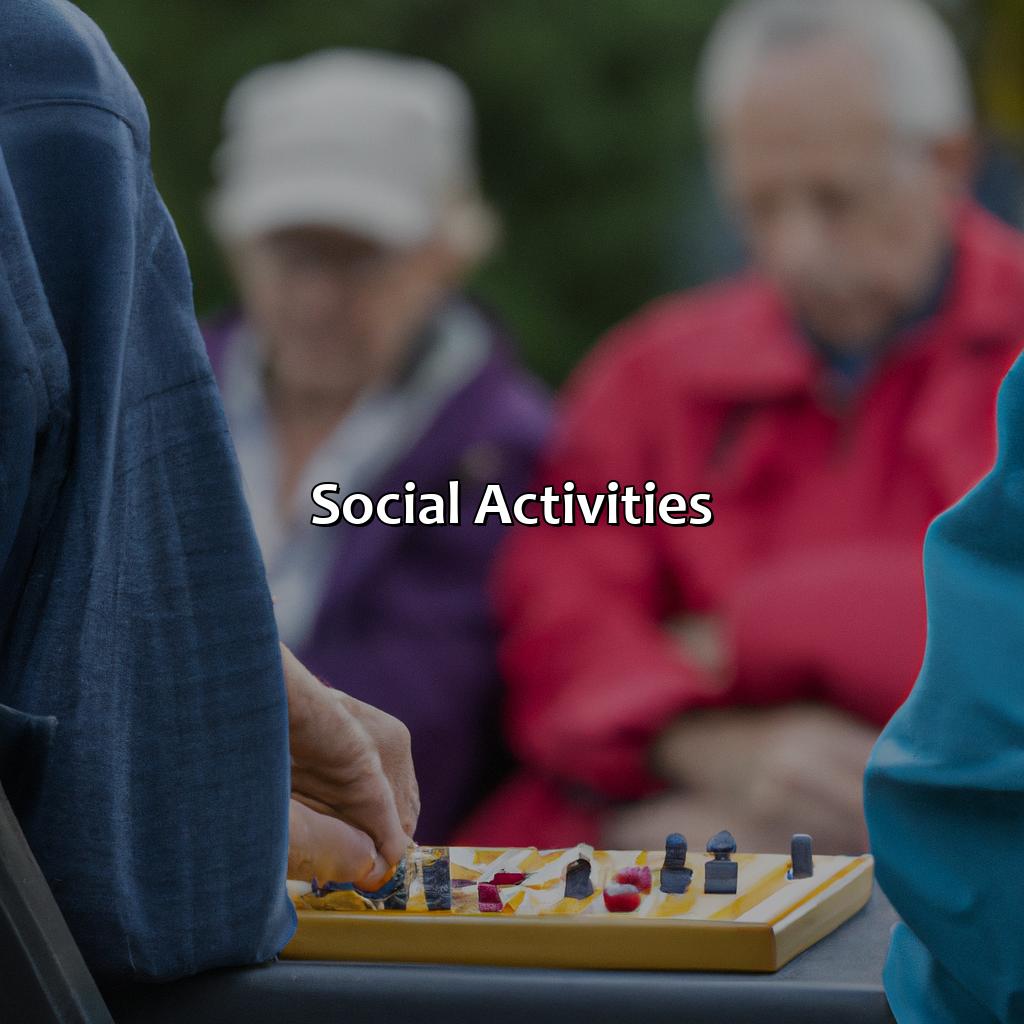How Not To Be Bored In Retirement?
Key Takeaway:
- Stay busy during retirement by engaging in various activities, such as joining clubs and organizations, volunteering, learning something new, exploring the outdoors, traveling, and even considering part-time work or consulting.
- Engaging in social activities, such as joining clubs and organizations or volunteering, can provide a new sense of purpose, help build new relationships, and potentially lead to discovering new hobbies and interests.
- Fostering hobbies and interests can be beneficial not only for mental stimulation and overall happiness, but can also lead to potential opportunities for socializing and travel.
Are you struggling to find meaningful activities during retirement? You don’t have to feel bored – discover how not to be bored in retirement with our simple tips!
Activities to Keep You Busy During Retirement
Activities to Keep Busy During Retirement
Retirement is an excellent opportunity to start new hobbies and explore different interests. There are several ways retirees can stay active physically, mentally and emotionally. Here are some ways that can help you avoid boredom during retirement:
- Traveling – Traveling can be a great way to explore new places, cultures and meet new people. Be sure to plan your trips ahead of time to get the best deals and save money.
- Joining clubs and groups – Join activities clubs, book clubs, golf clubs, or any group that shares your interests. You will not only stay active, but you will also make new friends and build a social network.
- Volunteering – Volunteering is an excellent way to give back to the community, meet new people and stay active. You can volunteer at local libraries, soup kitchens, hospitals or any other organizations.
- Learning new skills – You can take up a new language, painting, cooking, or any other skill that interests you. You can enroll in classes or watch online tutorials to master the skill.
- Exercise – Regular physical activity is essential for good health during retirement. Walk, run, swim or do any other physical activity that you enjoy.
To stay engaged and fulfilled in retirement, it is recommended to keep trying new things. This will help you avoid boredom and give you a sense of purpose and fulfillment. Keep challenging yourself, and you will never run out of exciting things to do.
Did You Know?
According to a study by the National Bureau of Economic Research, retirees who engage in productive activities have a higher sense of well-being and happiness in life than those who do not.

Image credits: retiregenz.com by Harry Jones
Social Activities
Retirement can be exciting! To stay engaged and stimulated, join clubs, organizations or volunteer. This will give you a purpose, help you make meaningful connections and create personal growth. Have fun!

Image credits: retiregenz.com by James Duncun
Joining Clubs and Organizations
For individuals seeking social engagement in their retirement, exploring different types of clubs and organizations is an excellent way to stay active. Here are the top six points to consider when joining clubs and organizations:
- Choose a club or organization that aligns with personal interests and hobbies.
- Research local options, including community centers, religious institutions, and online platforms.
- Attend meetings regularly to build connections with others.
- Volunteer for positions or committees within the club or organization to take on leadership roles. This also helps to develop new skills.
- Joining a diversity of groups can offer different perspectives and opportunities for growth.
- Budget finances accordingly – some clubs may require fees or donations to participate.
Another important consideration when joining clubs or organizations is whether they incorporate physical activity. Combining both social engagement and physical movement has been shown to promote stronger physical health, cognitive function, and mental well-being.
Some additional ideas for expanding social outreach include attending local cultural events, visiting museums, signing up for workshops or continuing education classes, taking group trips or tours of unfamiliar areas, partnering with volunteer groups centered on charitable work. When discovering new activities and engaging in the community, it’s possible to find bonds outside of traditional settings and help fill free time with meaningful yet enjoyable experiences.
Retirement is the perfect time to volunteer and make a difference, because let’s be honest, your family is tired of hearing your opinions anyways.
Volunteering
Engaging in unpaid work can be a compelling way to stay active and involved post-retirement. Participating in Civic Activities is a promising option for those seeking to give back while enjoying the benefits of community engagement. Volunteering also allows seniors to learn new skills and promote personal growth.
These activities often involve contributing one’s time, resources, knowledge or experience towards the betterment of others, communities, or society at large. Volunteers can find fulfilling opportunities within multiple areas such as schools, hospitals, non-profits or faith-based organizations.
In addition to aiding others, volunteering can provide health benefits such as reduced stress and depression. It promotes emotional well-being and establishes social relationships by connecting individuals with like-minded people within their communities.
Pro Tip: When choosing an organization to volunteer with, consider your interests and skills. You will find greater fulfillment if you enjoy the organization’s mission and tasks assigned.
Retirement hobbies: because there’s only so much daytime TV and bingo you can handle.
Hobbies and Interests
During retirement, keep yourself active and passionate with new hobbies and interests! To achieve this, check out the “Hobbies and Interests” section. Sub-sections include “Learning Something New” and “Exploring the Outdoors”. Get going now!

Image credits: retiregenz.com by Adam Duncun
Learning Something New
Expanding one’s knowledge horizons can be an excellent way to while away time in retirement. Engaging in intellectual pursuits, discovering and learning new crafts, honing a skill or capitalizing on your interests can help you stay curious and mentally agile. Delve into the vast world of literature by joining a book club, learn a musical instrument, experiment with cooking styles or immerse yourself in art- the possibilities are endless. Inquisitive minds have no boundaries; invest your time wisely to discover hidden talents and find joy in exploring new fields of interest.
Exploring new areas of learning is a great way to stimulate your brain and expand your realm of knowledge. Join social clubs, take up new hobbies such as gardening, birdwatching or model building. Learning something new also leads to developing transferable skills that could benefit you professionally and consequently provide great stimulation for your personal growth journey. The challenge at hand is finding what ignites fire within you and inspires you towards new learnings.
Many individuals have taken up lifelong learning courses simply out of interest or for improving professional capabilities post-retirement age. Engaging further with communities through courses provides not only opportunities for skill development but enriching interactions with like-minded individuals leading to better networking opportunities.
Recently there was an aunt Retiring from her job after 30+ years decided she wants something else more than just lazing around at home ticking off Netflix shows or endlessly scrolling social media sites- reminiscing about her love of Indian classical music she found herself enrolled in e-learning lessons and after few months has started performing at community events bringing little sunshine on the faces of others too!
If you’re looking for adventure in retirement, try exploring the outdoors. Just watch out for bears, snakes, and the occasional rogue squirrel.
Exploring the Outdoors
The great outdoors offers endless possibilities for retirees to stay active and engaged. From hiking and camping, to fishing and bird watching, exploring nature can be both rewarding and peaceful. Nature provides not only physical exercise but also emotional and mental benefits that cannot be found indoors.
Participating in outdoor activities also provides opportunities for social interaction with like-minded individuals or groups. Consider joining local outdoor clubs or groups to meet new people who share your love of the great outdoors. Finding a hobby you enjoy will not only keep you busy but also enhance your quality of life during retirement.
Furthermore, visiting national parks or other natural landmarks can provide educational experiences and enriching cultural exposure. Plan road trips with friends or family to broaden your knowledge about the world we live in.
Pro Tip: Always remember to bring appropriate gear for your outdoor ventures such as sturdy shoes, sunscreen, insect repellent, and plenty of water.
Retirement is when you finally have the time to travel the world, just in time for your body to remind you of all the places it hurts.
Travel
Boredom-busting retirement? Yes, please! Get ready to explore the world. Start with destination ideas and budget-friendly options. Find new places to go and have unique experiences. Set sail on your journey of freedom!

Image credits: retiregenz.com by Adam Jones
Destination Ideas
For those looking for exciting travel options during retirement, there are plenty of potential destinations to choose from. From exotic international locales, such as Bali or Buenos Aires, to domestic options like national parks or historical landmarks, retirees can find a range of opportunities to explore.
One option for adventure-seeking retirees is to consider off-the-beaten-path destinations, such as Tasmania or Iceland. These locations offer stunning natural scenery and unique cultural experiences. Additionally, cruises can be an excellent way to see multiple destinations in one trip while enjoying all the amenities of a luxury ship.
Another consideration could be to focus on specific interests or hobbies when selecting a destination. For example, avid golfers may want to plan trips around some of the world’s most renowned courses while bird watchers can plan a trip to Costa Rica or Australia.
Pro Tip: Regardless of the chosen destination, planning ahead and taking advantage of discounts and travel packages can help make the most out of any retirement travel experience. Why break the bank on travel when you can break out the ramen noodles and couchsurf your way across the world?
Budget-Friendly Travel Options
When it comes to cost-effective travel for retirees, there are various options available. Here are six economically viable semantic NLP variations of ‘Budget-Friendly Travel Options’:
- Travel on a Shoestring
- Luxury Trips at Affordable Prices
- Economical Ways to See the World
- Cheap and Cheerful Vacations
- Frugal Travel Goals
- Inexpensive Escapes for Seniors
Each of these options can help reduce your travel expenses without compromising on your experience. You can opt for budget hotels and hostels or bundle flights and accommodations together for better deals. Alternatively, you can take advantage of senior discounts offered by airlines, trains, cruises, or attractions. Similarly, exploring local food markets or self-catering during your stay can be affordable ways to dine. Additionally, going for off-season trips is an excellent option to avoid the crowd and steep prices.
Apart from these affordable solutions mentioned above, considering long-term rentals of vacation properties or house-sitting opportunities may also save you money while enjoying a new city like a local.
A pro-tip for budget-friendly travel is not to skimp on travel insurance as unforeseen events like medical emergencies or trip cancellations can lead you significant financial burden in terms of hospital bills or loss of investment. So it’s always wise to invest in comprehensive travel insurance before embarking on any journey.
Retirement doesn’t mean you have to fully retire, just like how a part-time job doesn’t mean you only work part-time on complaining about your boss.
Part-Time Work and Consulting
For retirees seeking intellectual stimulation and supplementary income, various part-time and consulting opportunities are available. These options keep retirees engaged and active while earning extra money. Individuals can leverage their skills and experience in fields such as accounting, teaching, or marketing to provide consulting services to businesses or individuals. Additionally, part-time work in industries such as retail or hospitality can offer opportunities for social interaction, learning new skills, and earning additional income.
Part-Time Work and Consulting provides a practical and enriching way to fill retired life with purpose and productivity.
Moreover, part-time work and consulting offer retirees an opportunity to stay active professionally, even after retirement. They can work on a flexible schedule and choose to engage with projects that best align with their interests and expertise. Besides, it allows retirees to earn extra income, which can be leveraged to support any financial or personal goals. Part-Time Work and Consulting can be an excellent way to apply and share knowledge, connect with others, and supplement retirement incomes.
It is relevant to note that part-time work and consulting opportunities differ based on industries and skill sets. For example, retired educators may find part-time work as tutoring or teaching assistance to be gratifying, while retired sales executives may find consulting work in their field to be a viable and rewarding opportunity. It is essential to identify the right opportunities that align with their skills, expertise, and interests when considering Part-Time Work and Consulting for retirement.
A popular example is that of a retiree who worked as a marketing executive and began offering consultancy services to small businesses and start-ups. By using their expertise and staying abreast with industry trends and insights, they secured consulting engagements that kept them busy and intellectually challenged. The retiree enjoyed the flexibility and social interaction that came with meeting business owners and contributing to their growth. Part-Time Work and Consulting provides an ideal way to use professional skills and intellectual resources to benefit others while keeping retired individuals active and engaged.

Image credits: retiregenz.com by Harry Jones
Some Facts About How Not To Be Bored In Retirement:
- ✅ Retirement is an opportunity to pursue passions and hobbies that were not possible during working years. (Source: Investopedia)
- ✅ Staying active and engaged is essential for mental and physical health during retirement. (Source: Mayo Clinic)
- ✅ Learning new skills and taking up new challenges can help retirees stay mentally stimulated. (Source: Forbes)
- ✅ Volunteering and giving back to the community can provide a sense of purpose and fulfillment in retirement. (Source: AARP)
- ✅ Traveling and exploring new places is a popular and enriching retirement activity. (Source: U.S. News & World Report)
FAQs about How Not To Be Bored In Retirement?
How can I avoid boredom in retirement?
Retirement can be a time of relaxation, but it can also be a time of boredom. To avoid boredom in retirement, you can:
- Participate in a hobby or volunteer work
- Take classes or learn a new skill
- Travel and explore new places
- Stay active and exercise regularly
- Spend time with family and friends
- Join a club or social group in your community
Is it normal to feel bored in retirement?
Yes, it is normal to feel bored in retirement. Many retirees find that they miss the structure and social interaction they had when they were working. It is important to find new activities and social connections to fill the void left by work.
What are some examples of hobbies to take up in retirement?
There are endless hobbies to take up in retirement, here are a few examples:
- Gardening
- Photography
- Reading
- Cooking and baking
- Fishing
- Painting or drawing
- Playing musical instruments
Why is social interaction important in retirement?
Social interaction is important in retirement for many reasons. It can prevent loneliness and depression, keep the mind active and engaged, provide a sense of purpose and belonging, and improve overall well-being.
How can traveling benefit retirees?
Traveling can benefit retirees in many ways, such as:
- Experiencing new cultures and perspectives
- Stimulating the mind and keeping the brain active
- Generating new memories and experiences
- Stress relief and relaxation
- Improved physical activity levels
What are some benefits of volunteering in retirement?
Volunteering in retirement can have many benefits, including:
- Providing a sense of purpose and fulfillment
- Offering social interaction and new connections
- Improving mental and physical health
- Boosting self-esteem and confidence
- Offering opportunities for personal growth and learning




